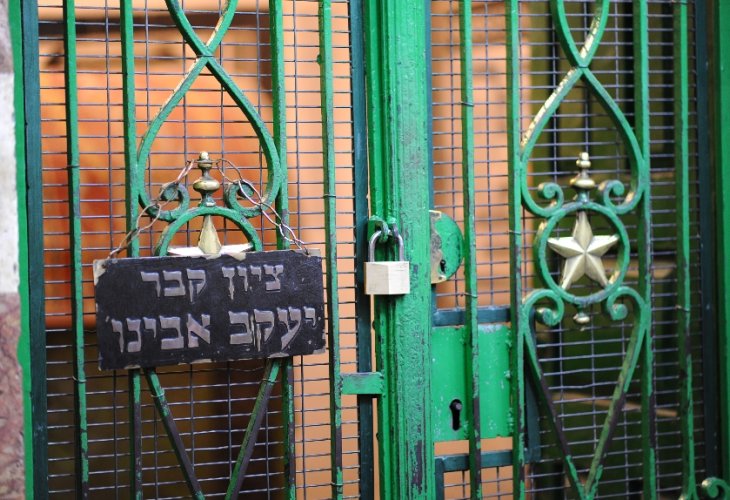Torah Personalities
Yaakov Our Forefather: The Life, Struggles, and Spiritual Legacy of the Third Patriarch
From the birthright and the blessings to exile, revelation, and unity — exploring the timeless lessons of Yaakov's journey and his impact on the Jewish people
 The resting place of Jacob at the Cave of the Patriarchs (Photo: Flash90)
The resting place of Jacob at the Cave of the Patriarchs (Photo: Flash90)Yaakov, son of Yitzchak and Rivka, is the third of the Patriarchs, twin brother of Eisav, and the father of the twelve tribes of Israel.
A Life Marked by Struggle
Yaakov’s life began with conflict: a struggle with his twin brother over parental love and the birthright. After taking the blessing that Yitzchak intended for Eisav, Yaakov was forced to leave his parents and flee to Charan, where he faced a cunning father-in-law and significant challenges.
The Birthright and the Stolen Blessing
Yaakov acquired the birthright from Eisav in exchange for a bowl of lentil stew. Later, through a plan initiated and encouraged by his mother Rivka, Yaakov disguised himself as Eisav to receive the blessing Yitzchak intended for Eisav.
Eisav threatened to kill Yaakov, prompting Rivka to send Yaakov away. Yaakov, the “dweller of tents,” had to leave his home and family involuntarily. Before departing, Yaakov received a blessing from Yitzchak — of land and descendants, and on his journey to Charan, he experienced a divine revelation in his famous dream of the ladder, receiving God’s assurance regarding his future and protection.
Yaakov's Early Devotion to Torah
Rabbinic literature describes Yaakov — like his father and grandfather, as an elder who learned in a yeshiva. According to Midrash, Yaakov's yearning for Torah began even in the womb: when Rivka passed synagogues or houses of study, Yaakov would struggle to go out.
Yaakov's Righteousness
The Torah describes Yaakov as “a wholesome (tam) man,” which the Sages interpret literally: a complete, pure individual, born circumcised and without blemish — unlike Eisav. Yaakov symbolizes light, while Eisav represents darkness, with all that implies.
Justifying the Deception
Given Yaakov's righteousness, the Midrashim also justify his deception when he impersonated Eisav to receive the blessing. One Midrash explains that the act was extremely difficult for Yaakov, but two angels supported him and helped him carry it out.
Yaakov Instituted the Evening Prayer
Like his father and grandfather, Yaakov established one of the daily prayers. He is credited with instituting Ma’ariv, the evening prayer.
The Spiritual Meaning of Yaakov's Prayer
The “Shem MiShmuel” explains: “Yaakov instituted the evening prayer because even when a person falls to the lowest darkness after having once ascended spiritual heights, he must not despair. He must gather his remaining strength and pray — just as Yaakov did when he himself was in a state of deep personal darkness and feared he might fall into severe sins… Yet he did not panic. His mind remained settled for prayer.”
Yaakov as a Symbol of the Jewish People
In the Midrash, Yaakov — Israel, represents far more than an individual. He symbolizes the entire Jewish nation. Eisav — Edom, is depicted as the archetype of Israel’s oppressors, particularly Rome and Titus, destroyer of Jerusalem.
Yaakov's Final Message: Unity
At the end of his life, Yaakov gathered his sons and told them: “Assemble… gather together.” A Midrash compares this to an elderly father near death: he summons his sons, places a bundle of reeds before them, and shows them that while one reed can be easily broken, the entire bundle cannot be broken.
His message: If they remain united, they will overcome all enemies.
If they become divided, they can be easily defeated, one by one.

